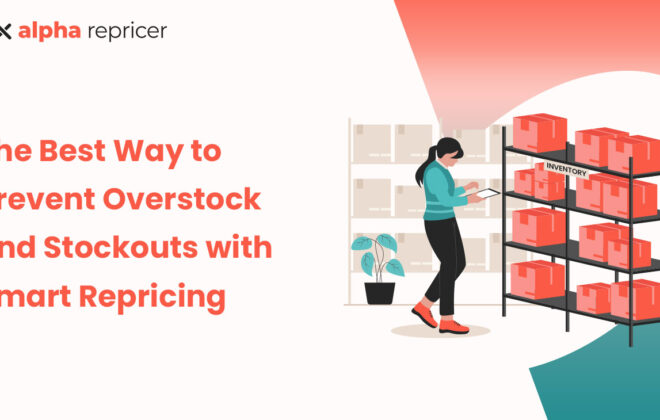How Does AI Help Amazon Sellers? Artificial Intelligence in eCommerce
Artificial Intelligence is now taking over the world by making tasks easier and faster for all of us. While some people feel threatened by the power of AI, eCommerce sellers view it as a chance to grow their businesses and succeed on the platform.
It is crucial to remember that the role of AI in e-commerce, particularly on Amazon, is continuously progressing. Since Amazon sellers are already using automated tools to stay ahead in the game, they must take a step toward understanding the opportunities provided by AI to outplay their competitors.
You cannot ignore the benefits of AI. This is the reason we’re here to talk about how AI tools are assisting Amazon sellers in increasing their productivity so they can accomplish their goals on Amazon.
1. Product recommendations and sourcing:
Amazon sellers need to research thoroughly to understand what’s new in the market before offering the products on Amazon. AI-powered tools take this burden off your shoulders by analyzing market trends, competitor data, and customer behavior to suggest unique products that are high in demand. Moreover, an AI tool makes sure that the product it suggests is according to your niche, and doesn’t have a lot of competitors.
In order to offer individualized product recommendations, AI-powered algorithms also review the browsing and purchasing history of customers. This benefits sellers by making their products more visible and easier to find for prospective customers.
2. Content creation
Amazon sellers must have the most attractive content on their product page to engage maximum customers. Amazon sellers can take advantage of ChatGPT, which is the latest AI tool to come up with a content strategy, brand story, and product descriptions that are search engine optimized.
If you are stuck on how to name your products on Amazon, it can also create catchy product titles and one-liners to allure buyers. Although the content generated by ChatGPT might be plagiarized at times, but it is the best way to get ideas on how to write or shape your content for Amazon.
3. Pricing optimization:
Pricing is the most concerning factor for Amazon sellers and the one that requires their attention. However, AI algorithms can dynamically adjust product prices based on various factors like demand, competition, and historical sales data. This helps sellers find the right balance between maximizing profits and maintaining competitiveness.
Plus, it saves time! while the algorithmic repricing tool monitors market trends, customer demand, and competitor pricing, you can focus on other business areas without having to worry about your product prices.
4. Inventory management:
AI-based inventory management tools can help sellers predict customer demand patterns and manage their inventory levels effectively. AI systems can examine historical sales data, fluctuations in demand, seasonality, and other similar variables. Accurate demand forecasting like such enables sellers to optimize stock levels, remove surplus inventory, and minimize stockouts; which eventually boosts productivity and lowers costs. By using the right AI tool for inventory management, sellers can improve customer satisfaction by never running out of stock, and also maintain better control over their supply chain.
5. Automated customer support:
Chatbots are transforming the role of customer service by bridging the gap between buyers and sellers/businesses. chatbots which are powered by AI and virtual assistants can help in handling common issues of customers. Moreover, they can provide information about products and orders, and offer support 24/7. As a result, it improves response time and enhances customer experience. You can also automate email responses by signing up with a customer service software tool.
6. Sales Analytics:
AI systems can analyze a large quantity of data, including sales patterns, consumer behavior, and market insights, to give sellers useful information and reports. This encourages data-driven decision-making and the discovery of growth opportunities for Amazon sellers. AI can also track the activities of other competitors, price changes in the market, and new product launches for sellers to adjust their selling strategies accordingly.
7. Advertising and marketing optimization:
AI-powered tools can manage and optimize Amazon advertising campaigns to reach the right audience and improve the return on investment (ROI) for ad spend. Amazon’s Sponsored Products is a perfect example that makes use of algorithms to optimize ad targeting and bidding strategies. Advertising with the help of AI can help sellers increase visibility for their products, which is exactly what they need to maximize sales.
8. Performance insights:
As Amazon sellers, it is important to keep track of your performanceto identify the weak points and strengths of your business. AI tools can provide sellers with useful insights and data-driven reports on their performance metrics, to help them improve their business areas and get better at what they do.
9. Keyword research and SEO:
AI tools can analyze search trends and customer search queries on Amazon to identify relevant keywords and optimize product listings for better visibility in search results.
In conclusion,
AI solutions will keep on evolving and can help Amazon sellers as well as the entire eCommerce community to automate their operations, reduce costs, and make better decisions to sell better. Make sure to find the right AI-powered tools to help you in your selling journey. Good luck!
Author
Related Posts
Latest posts





